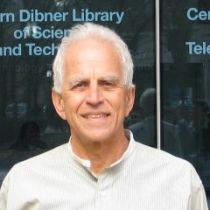A Winning Paper
Paper by Professor Emeritus David Goodman Honored for Lasting Value
Each year, the Institute of Electrical and Electronics Engineers (IEEE) Communications Society gives an Award for Advances in Communication to one outstanding paper of lasting value published in its journals during the previous 15 calendar years.

Professor Emeritus David Goodman
The recipient of the 2015 award was “Efficient Power Control via Pricing in Wireless Data Networks,” a seminal paper co-authored in 2002 by Presidential Fellow and Professor Emeritus of Electrical and Computer Engineering David Goodman, who served for several years as the director of the school’s Wireless Internet Center for Advanced Technology (WICAT).
The paper--written at a time when cellular networks were increasingly being used to send data like photos and text messages—was among the first to apply game theory to the process of wireless transmission.
Goodman explains that when transmitting over wireless networks, the power must be strong enough that the cellular tower receives and decodes the data—but not so strong that a user’s cell-phone battery drains too quickly or that other users experience excessive interference. The paper states, “Users access a wireless system through the air interface which is a common resource and they transmit information expending battery energy. Since the air interface is a shared medium, each user’s transmission is a source of interference for others. The signal-to-interference ratio (SIR) is a measure of the quality of signal reception for the wireless user. Typically, a user would like to achieve a high quality of reception (high SIR) while at the same time expending a small amount of energy. Thus, it is possible to view both SIR and battery energy (or equivalently transmit power) as commodities that a wireless user desires. There exists a tradeoff relationship between obtaining high SIR and low energy consumption. Finding a good balance between the two conflicting objectives is the primary focus of the power control component of radio resource management.”
Goodman and his co-authors—Cem U. Saraydar, then a graduate student, and Narayan B. Mandayam, a Rutgers University professor—realized that applying the lessons of John Nash, the mathematician known for his work on game theory, could be an effective way to regulate power control.
Game theory involves mathematical models of conflict and cooperation between rational actors, and it is useful when analyzing situations in which two or more actors must make independent decisions that will impact one another’s outcome. The authors defined a measure of “utility” that combines the goals of high signal quality and long battery life. They derived a power control technique for data transmission that leads to a Nash equilibrium—an optimum condition in which no single device can increase its utility acting alone. In other words, when all participants act reasonably in their own best interests, the entire system benefits.
Since the paper was published in IEEE Transactions on Communications, numerous other researchers have applied such microeconomic principles to wireless communications—a fact acknowledged by the IEEE Communications Society, which deemed Goodman and his colleagues’ efforts to have opened new lines of work, envisioned bold approaches to communication, formulated new problems to solve, and essentially enlarged the field of communications engineering.
For Goodman—who holds several patents and has written or co-written numerous books, including the popular text Probability and Stochastic Processes: A Friendly Introduction for Electrical and Computer Engineers, now in its third edition—the award was welcome not only because of the peer recognition it conferred but because it served as a reminder of a particularly collegial collaboration. “I was working with a bright graduate student and a professor that I myself had mentored,” he recalled. “I guess you could say we were three generations of academics, and I was the grandfather. It was an exciting time.”
“Efficient Power Control via Pricing in Wireless Data Networks” is the second paper co-authored by an NYU Tandon School of Engineering professor to garner a Communications Society Award for Advances in Communication in recent years; in 2013, Professor Elza Erkip was honored for her paper on user cooperation diversity.




